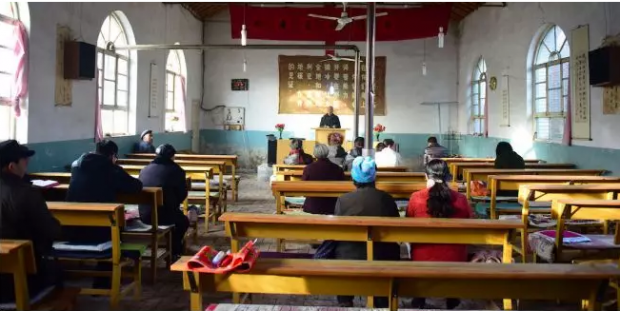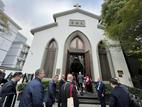February 11, the second day of the Spring Festival, marked the first Sunday after the lunar new year. Visiting a church in another village, the closest one to my hometown, I expected a larger turnout due to the Spring Festival homecoming, but there were only a total of 11 people in the church.
After taking my seat, I glanced around. The church was quite spacious, capable of accommodating over 100 people. The church was warm inside, with two vertical air conditioners working. Two church workers in their 60s (a lady and a gentleman) led the congregants in singing without music, with four believers presenting songs at the altar.
During the sermon, a middle-aged Christian man was invited to share a sermon, beginning with a testimony. As the evening before this Sunday service, dense fog set in with low visibility. he was determined to come for the sermon after some inner struggle. With faith on the road, he prayed to God to dispel the fog, which later lifted. Facing the small congregation, he expressed his sentiment in the church, stating that even if one person among them listened and changed, his journey would not be in vain.
After the gathering, I conversed with the founder of the church, an elderly woman around 80, and her son, who currently oversees the main affairs of the church. We discussed the church's development, changes in attendance, challenges, and matters concerning the pulpit.
The elderly leader mentioned that the rural church has a history spanning over 20 years. Initially, they rented vacant factory buildings and cinemas for gatherings. Later, they acquired the current location and completed the necessary registration procedures. The attendance at meetings could reach 70 to 80 people at its peak, but typically 40 to 50 people gather during one service.
Regarding the low attendance during the Chinese New Year, she shared several reasons. Firstly, during the grandest holiday in China, people visit relatives and friends, making it difficult for some to attend church services. Secondly, some non-Christian family members create reluctance for Christian family members to join the gathering. Concerning the second point, the elderly leader mentioned that believers should build good relationships with their unbelieving family members, otherwise, the latter would pose obstacles to their faith.
She shared an incident where a Christian woman, upon accepting faith, removed the ancestral worship items her non-Christian husband dedicated to gods. As a result, he severely beat her, and their relationship deteriorated. It took a considerable amount of time for their relationship to gradually improve.
Just before this Sunday service, another Christian lady sought her opinion on whether to attend due to her non-Christian family. This elderly leader advised her to decide based on her situation after prayer, reassuring her that seeking God at home was also a valid option.
The founder of the church explained several reasons for the decline in regular attendees. Some elderly believers passed away, some faced mobility challenges, and some moved to the city to live with their children. In addition to these reasons, certain measures taken by the church in response to government policy and regulation led some believers to leave. For instance, some believers couldn't accept the display of the national flag within the church premises.
Alongside the decrease in attendance, the lack of young members poses a significant challenge for the church. There are only two relatively young believers in the church. A 45-year-old Christian woman, accompanying her child in her studies, can play the piano but seldom comes to church. The other one is the son of the elderly leader, around 50, who used to be involved in the transportation business but had to stay home due to a significant car accident.
Another challenge the church faces is the weakness in pastoral ministry.The church primarily invites pastors from urban churches to preach at Sunday services. The son of the elderly leader, who has studied theology, also shares one to two times a month. Currently, it seems that pastoral care is insufficient to meet the needs of the believers. When faced with some heretical sects, rural pastors find it challenging to accurately discern.
In the backdrop of urbanization, what lies ahead for rural churches? Although this rural church and surrounding ones are not affiliated with urban churches, the urban ones are willing to assist in terms of pastor care and facility supply. Upon learning that this church lacked heating equipment, an urban church promptly donated two vertical air conditioners.
I also heard about two cases where urban churches assisted in the development of rural churches. In one region, a struggling village church on the verge of closing experienced a revival with the help of manpower and resources from an urban church. In another area, the leader of the local church directly arranged for a main pastor to move from the city to a declining rural church, helping it to regain vitality.
- Translated by Abigail Wu












